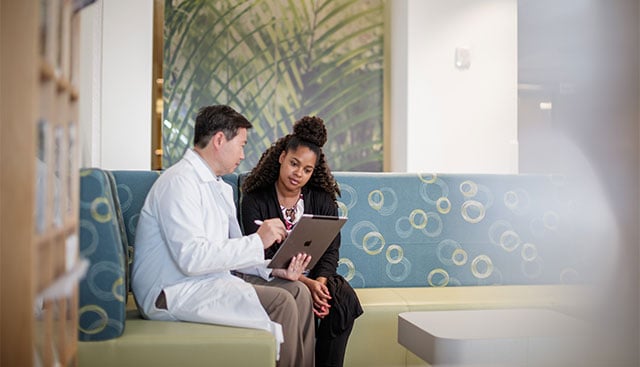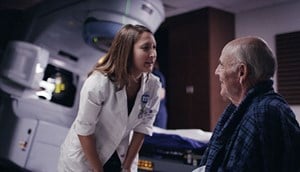
When Do You Need to See an Oncologist?
An oncologist is a physician who specializes in diagnosing and treating cancer. If you experience any unusual health changes, such as overwhelming fatigue, unintended weight loss, unexplained pain or a persistent lump, you should see a medical professional right away. Most likely, you will start with your primary care provider.
Following an in-depth discussion of your symptoms, your physician will perform a physical examination and may order one or more diagnostic tests, such as bloodwork or imaging. If he or she suspects that you have a tumor based on the results of the preliminary evaluation, your physician will likely refer you to an oncologist for follow-up care. If so, you will be matched with an oncologist who focuses on your suspected cancer type.
What will your oncologist do?
 Before you meet with your oncologist, he or she will review your health history and test results, then compile your information into a single, comprehensive file. During your first in-person visit, your oncologist will ask you to tell your story in detail so he or she can hear it from your perspective, get to know you better, confirm the information in your medical chart and fill in any gaps. Next, your oncologist will likely perform a physical examination and may order further diagnostic testing, such as a biopsy, to confirm your diagnosis.
Before you meet with your oncologist, he or she will review your health history and test results, then compile your information into a single, comprehensive file. During your first in-person visit, your oncologist will ask you to tell your story in detail so he or she can hear it from your perspective, get to know you better, confirm the information in your medical chart and fill in any gaps. Next, your oncologist will likely perform a physical examination and may order further diagnostic testing, such as a biopsy, to confirm your diagnosis.
If you are diagnosed with cancer, your oncologist will work with other members of a multispecialty team to manage all aspects of your care. Toward that end, your oncologist will:
- Explain the general characteristics of the type of cancer you have
- Help you understand your particular diagnosis
- Review your treatment options, including the pros and cons of each, and make a tailored recommendation for you
- Answer your questions and help you make fully informed treatment decisions
- Help you manage any side effects of your cancer or its treatment
 Because you may understandably feel a bit anxious during your first consultation with your oncologist—and you will be presented with a significant amount of information at that time—you may want to ask a trusted family member or friend to accompany you. In addition to providing much-needed comfort, that person can serve as a "second set of ears," take notes and remind you to ask any questions that you might have forgotten.
Because you may understandably feel a bit anxious during your first consultation with your oncologist—and you will be presented with a significant amount of information at that time—you may want to ask a trusted family member or friend to accompany you. In addition to providing much-needed comfort, that person can serve as a "second set of ears," take notes and remind you to ask any questions that you might have forgotten.
Types of oncologists
Depending on the type of cancer therapy you ultimately select, you may work with other oncologists during the course of your treatment, such as:
- Surgical oncologists, who perform surgery to remove tumors
- Medical oncologists, who administer certain medications, such as those used during chemotherapy, targeted therapy and immunotherapy
- Radiation oncologists, who deliver radiation therapy
Consult with an oncologist at Moffitt Cancer Center
At Moffitt Cancer Center, your cancer diagnosis is our top priority. Whether you need a preliminary evaluation, a second opinion or an answer to a general question, you can rapidly connect with an experienced oncologist at Moffitt by calling 1-888-663-3488 or completing our new patient registration form online. If you are diagnosed with cancer, we will help you get started on a personalized treatment plan right away, then support you with compassionate care at every step of your journey.
